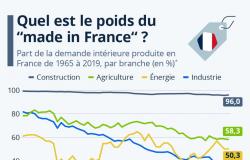Copernicus has just published its eighth report on the state of the ocean and the findings are more than alarming. In recent months, the oceans have been confronted with exceptional anomalies, including very deep underwater heat waves, unexpected plankton blooms, massive melting of sea ice, but also an increase in wave height.
To produce this report, 120 experts from around the world studied satellite observations, as well as measurements taken in the water. The rate of ocean warming has accelerated sharply since the 1960s and has almost doubled since 2005. The global average ocean temperature is increasing by +0.13°C per decade. All oceans are affected, with varying intensity: the Black Sea gains +0.65°C per decade and the Mediterranean Sea gains +0.41°C per decade. Generally speaking, the oceans in the Northern Hemisphere are warming much faster than those in the Southern Hemisphere.
A fifth of the ocean surface experienced a marine heatwave
One of the first characteristics of recent months is the multiplication of marine heatwaves, particularly around Europe and the Mediterranean. In 2023, 22% of the global ocean surface has experienced at least one vaguevague of heatheat severe to extreme, or a fifth of the ocean surface. The Atlantic Ocean is particularly affected: the surface area which experienced a heat wave increased from 20 to 90% between 1982 and 2023. In 2022, almost two thirds of the Baltic SeaBaltic Sea suffered from a marine heatwave. On the side of Ireland and peninsulapeninsula Iberian, temperatures exceeded the norm of +6°C compared to normal during these marine heatwaves which lasted on average 145 days. These heat waves are not only long and intense, they are also deep: these abnormally high temperatures have been measured up to 1,500 meters deep in the Mediterranean Sea. These marine heatwaves disrupted the migration of speciesspeciesdegraded them ecosystemsecosystems and led to mortalities of massemasse in certain areas.
Serial anomalies in the oceans
A particularly astonishing extreme event occurred in Crete in 2022: an intense cold snap in the water caused a “ extreme and late flowering of planktonplankton “. The mixing of cold and hot waters favored the concentration of nutrientsnutrientswhich caused the plankton bloom to explode.
The acidity of the water has also increased significantly: +30% since 1985.
Another consequence with a strong impact on the coasts: the highest waves in the world tend to be larger and larger.
No good news to report from the pole side, since both suffer from a sourcesource unprecedented sea ice. ArcticArctic2.2 million km² have melted since 1979 due to a temperature rise of +4°C. In Antarctica, the equivalent of three times that of France in terms of sea ice has disappeared since the 1980s.
Remember that the oceans are carbon sinks: they absorb greenhouse gasgreenhouse gas and excessive heat up to 90%. By delaying the climateclimatethey store too much heat and therefore heat up very quickly vitessevitesse with a cascade of effects on their functioning and the biodiversitybiodiversity that they contain.






